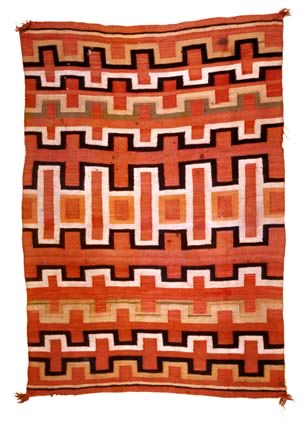 |
This is a file from the Wikimedia Commons. Information from its description page there is shown below.
Commons is a freely licensed media file repository. You can help.
|
| Description |
English: Transitional blanketDate: Circa 1880-1885
“I like this because the squares are all squares—there are no diamonds to mix it up. The weaver was consistent in her design choices.” —Barbara Ornelas (laughing)
“Diamonds are just little dots, like pixels, which are squares, so they’re all squares anyway.” —Michael Ornelas
“Yeah, mom. You take a diamond and turn it and—you know what you’ve got?—you’ve got a square!” —Sierra Ornelas (smiling)
“This blanket was woven at the end of the “wearing blanket era,” just as the railroad came into the Southwest in 1881. The heavier handspun yarns and synthetic dyes are typical of pieces made during the transition from blanket weaving to rug weaving.” —Ann Hedlund
Tapestry weave, interlocked joins
0.79 x 1.13 m; Tassels 0.040 m 44.488 x 31.102 in.; Tassels 1.575 in. Catalog No. 8369, Arizona State Museum
|
| Date |
1880-1885 |
| Source |
http://www.statemuseum.arizona.edu/exhibits/navajoweave/historic/blankets/8369_dtl.shtml |
| Author |
Unknown Navajo weaver, pre-1889 |
Permission
( Reusing this file) |
This is a faithful photographic reproduction of an original two-dimensional work of art. The work of art itself is in the public domain for the following reason:
| Public domainPublic domainfalsefalse |
 |
This work is in the public domain in the United States, and those countries with a copyright term of life of the author plus 100 years or less. |
|
This file has been identified as being free of known restrictions under copyright law, including all related and neighboring rights.
|
The official position taken by the Wikimedia Foundation is that "faithful reproductions of two-dimensional public domain works of art are public domain, and that claims to the contrary represent an assault on the very concept of a public domain". For details, see Commons:When to use the PD-Art tag.
This photographic reproduction is therefore also considered to be in the public domain. Please be aware that depending on local laws, re-use of this content may be prohibited or restricted in your jurisdiction. See Commons:Reuse of PD-Art photographs.
|
|
File usage
The following pages on Schools Wikipedia link to this image (list may be incomplete):
Through Schools Wikipedia, SOS Childrens Villages has brought learning to children around the world. SOS Childrens Villages helps those who have nothing and no one, giving them back the famly they have lost and bringing them the very best opportunities for a happy, healthy future. Will you help another child today?



